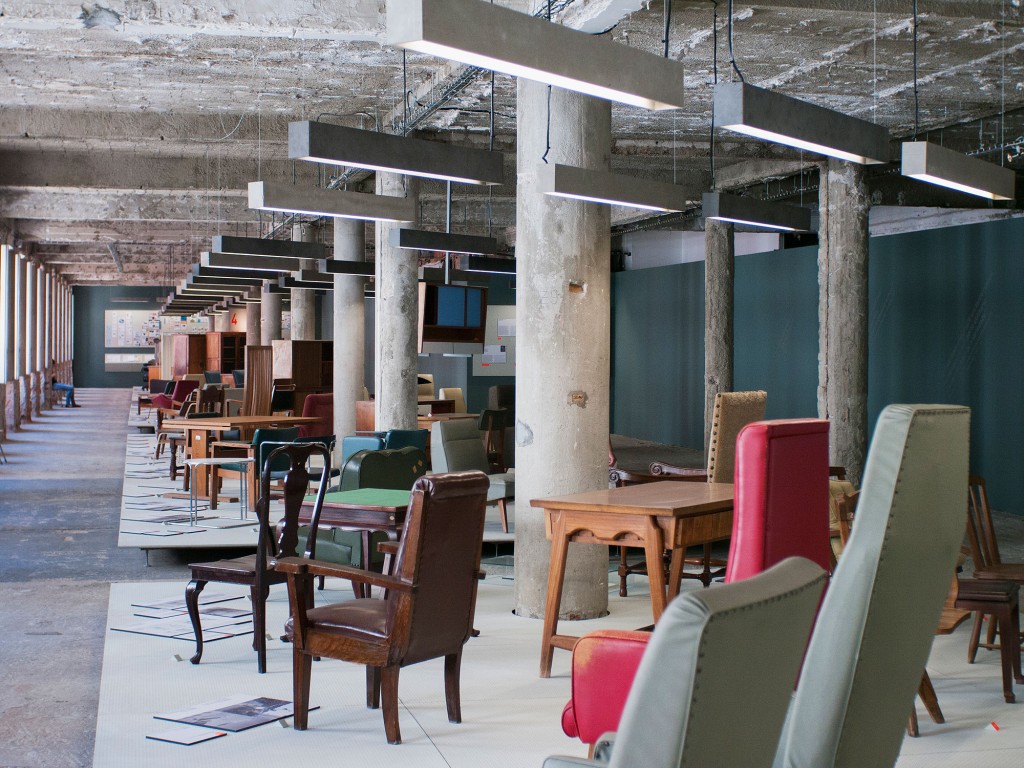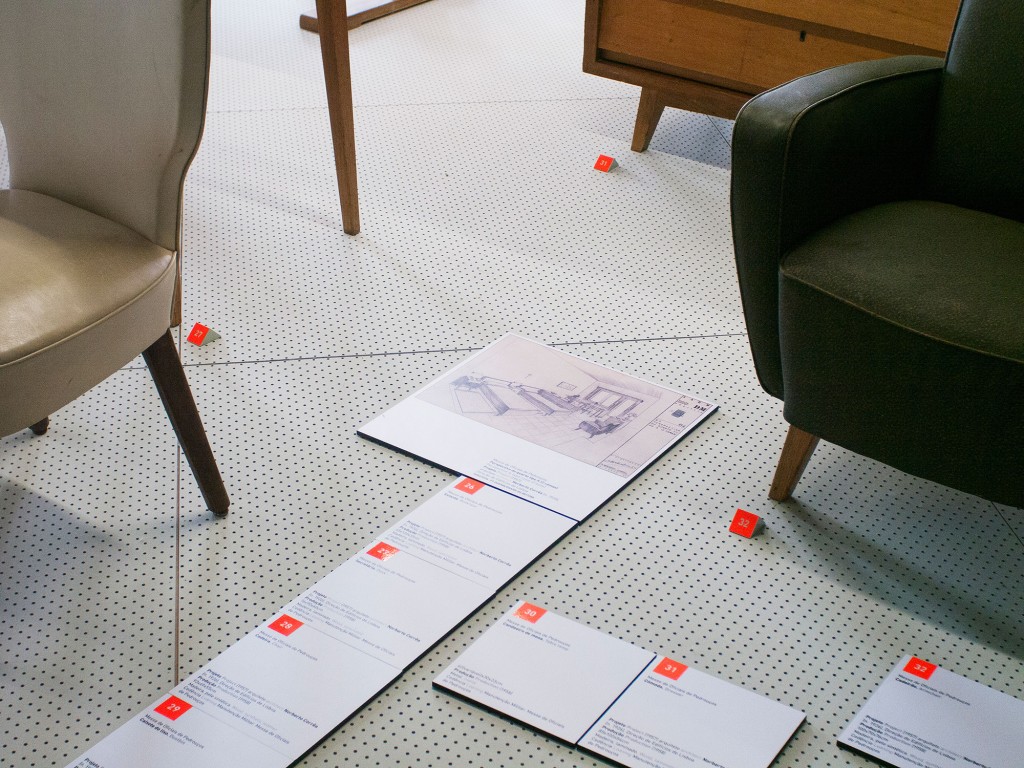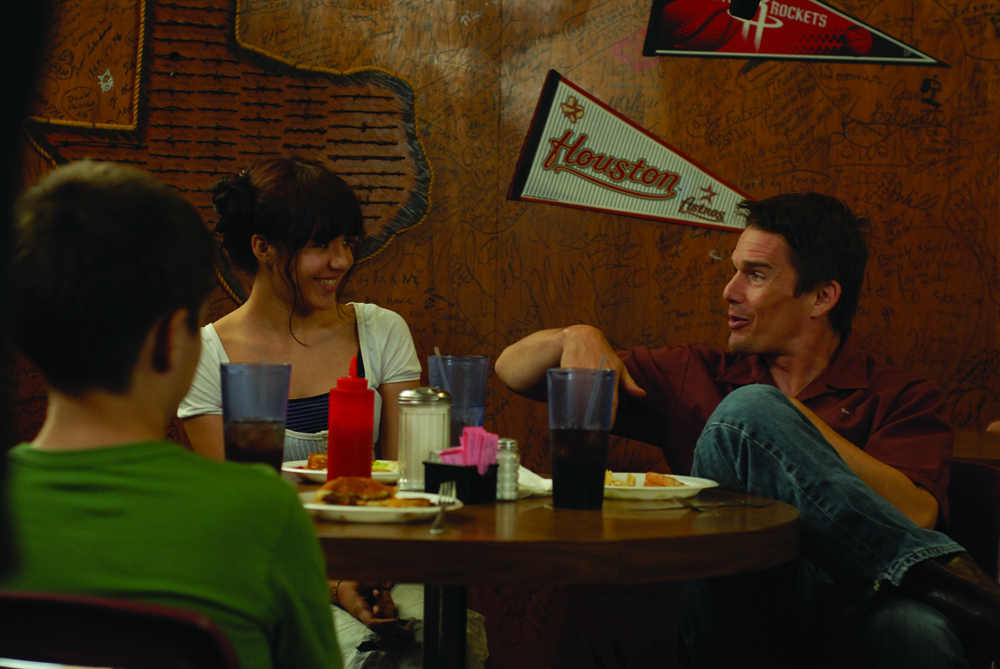The respect and discipline required to all, on view through November 2 at the Museu do Design e da Moda (MUDE) in Lisbon, is a perplexing exhibition to encounter at a design museum in a large city. Curated by João Paulo Martins, a Lisbon-based architect and professor, the show is simultaneously understated and wildly bold; its aim is not to showcase fine artistry nor craftsmanship, but rather to execute a quiet political critique (with extensive visual evidence) of pervasive state-sponsored mediocrity.
The exhibition presents approximately one hundred samples of unremarkable furniture commissioned by the Comissão para Aquisição de Mobiliário (CAM), a division of the Portuguese Ministry of the Interior that was established in 1940. The CAM’s role was to provide all of the furniture for Portugal’s state and government buildings through local commissions. As MUDE’s website notes, “The commissioning of furniture for official use in Portugal was an important stimulus for the economy of the sector. However, in the action of the State and its servers it is not found an investment in quality and accuracy nor any strategy aiming to make Portuguese industry more competitive as it happened in official offices in other countries.”
Presenting its evidence through four consecutive “nuclei,” The respect and discipline required to all attempts to show the shortsightedness and general deficiency of the CAM’s furniture commissions, specifically through an examination of its dubious political motivations. The show’s title, the museum’s site explains, is drawn from a quote from the Comissão para Aquisição de Mobiliário dating from 1950: “[The CAM’s] relative lack of ambition was expressed in the formula summarizing the main concern in the official furniture projects. The goal was to stage the image of the State, in its relationship with the citizens: bestow the public buildings with ‘a minimum of dignity, balance and good taste,’ materialize ‘the respect and the discipline imposed upon all.’”

The pieces of furniture chosen for The respect and discipline were sourced from a variety of locations in Portugal, from warehouses to the actual buildings from which they were initially installed (some of the pieces were still being used up until their entry into the exhibition). The exhibition explicitly notes that the furniture on display had not been cleaned or repaired prior to the mounting of the exhibition. Rather, the various states of disrepair afflicting the myriad chairs, benches, tables and other assorted pieces serve as visual evidence to support the curator’s thesis: the furniture commissioned under the CAM lacked inspiration in its design and was constructed using underperforming materials.
The crux of Martins’ argument stems from a decision within the CAM in the 1940s to invest in furniture that avoided international design styles and aesthetics as a means of boosting nationalist identity. The exhibition explains two trajectories pursued by the CAM: “rustic” pieces relating to Portugal’s agriculture and historicized pieces informed by “the scholarly languages of the past.” Accompanying wall text explains, “In all cases, it should be clear that ‘respect and discipline’ were intended to be established and maintained. The furniture should represent the everyday order, the authoritarian nature of the State in its relationship with individuals, in order to make explicit the hierarchies.”
The MUDE is located in a former bank, and its gallery spaces, which lack any sort of noticeable renovation or updating, reveal the raw industrial materials from which the building was constructed. The bare concrete and starkness of the space serve as perfect complements to the show (given its interest in exposing the degrading materiality of Portugal’s ephemeral state-sponsored furniture pieces), and its presence is a refreshing counterpoint to the museum’s permanent exhibition of famous modern and contemporary design featured on the first-floor gallery.

Still, on an ideological level, The respect and discipline required to all is not without its shortcomings. While Martins provides an exhaustive look at CAM commissions, his political critiques lack contemporary context, and one is left wondering about the lingering effects of the state’s “authoritarian” commission strategies as well as alternative routes that the state could have taken to improve the quality of its furniture. It should also be noted that the MUDE itself is not immune to domineering oversight. While admission to the museum is provided free-of-charge to visitors, the entire space is covered in elements of corporate sponsorship. The first floor lobby houses a large Samsung television and an accompanying text discussing the brand’s commitment to innovative design, and its top-floor exhibition of street artist André Saraiva features sponsors including Nescafé, Schweppes and Absolut. While corporate financial assistance in a museum setting is hardly a new or even notable phenomenon, its presence alongside an exhibition as politically idealistic as The respect and discipline required to all is immediately noticeable.
While the show is not without its imperfections, The respect and discipline required to all is still interesting and innovative as an anti-exhibition of design. It is certainly subtle, but its historical and political motivations, when considered with “respect and discipline,” can certainly be informative and thought-provoking.







